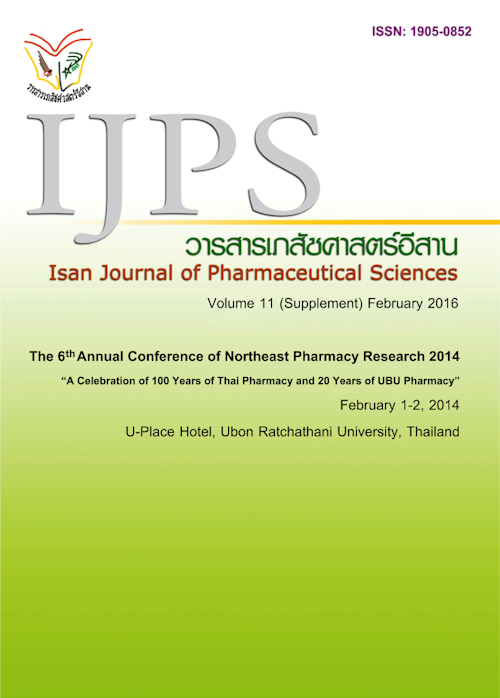In vitro screening test of Holy Basil and Other 3 Thai Vegetable Alcoholic Extracts on Rat CYP3A4 Enzyme Activity
Main Article Content
Abstract
Introduction: Vegetable has always been a part of almost every Thai dish. Since vegetable may affect on Cytochrome P450 enzyme function, food-drug interaction can possibly occur when having vegetable with certain medications. CYP3A4 is a member of cytochrome P450 enzyme taking part in metabolism of drugs such as anticancers, immunosuppressive agents and macrolides antibiotics. Ocimum sanctum L. (Holy basil or Ka Prao), Coccinia grandis (ivy gourd or Tam Leung), Tiliacora triandra (bamboo grass or Ya Nang) and Sauropus androgynus (star gooseberry or Pak Wan Ban) are Thai vegetables generally found in the northeastern part of Thailand. Risk determination of these vegetables to cause interaction with CYP3A4-mediated drug metabolism should be investigated for patient safety and best treatment outcome. The objective of this study was to test the effects of those 4 Thai vegetable crude alcoholic extracts on function of rat CYP3A4 enzyme in vitro. Materials and Method: Metabolic tests were duplicated carried out in vitro using rat liver microsome. Testosterone was used as a specific CYP3A4 probe substrate whereas positive control used was ketoconazole. The amount of 6β-hydroxytestosterone, a metabolite of testosterone, obtained from CYP3A4-catalyzing metabolic reaction in the presence of the crude vegetable alcoholic extracts was detected by using High Performance Liquid Chromatography (HPLC) technique followed by comparing to 6β-hydroxytestosterone detected from reaction without vegetable alcoholic extracts. Results: It was found that the alcoholic extracts of bamboo grass, star gooseberry, ivy gourd and holy basil affected on CYP3A4 enzyme function in wide range of inhibition (1.05, 7.56, 8.71, and 57.91 % inhibition respectively). Conclusion: It could be concluded that all 4 Thai vegetables inhibit CYP3A4 function in different degree. The same test using aqueous and hexane extracts of these vegetables should be done in the future.
Article Details
In the case that some parts are used by others The author must Confirm that obtaining permission to use some of the original authors. And must attach evidence That the permission has been included


